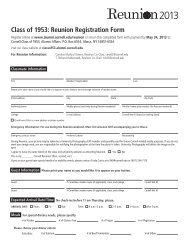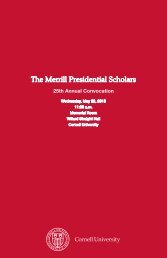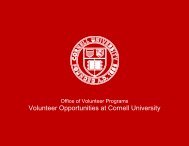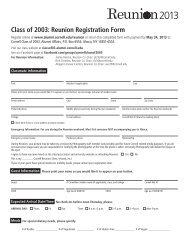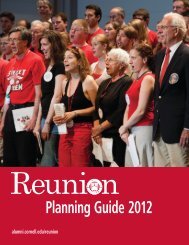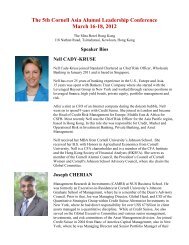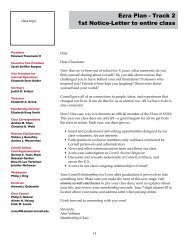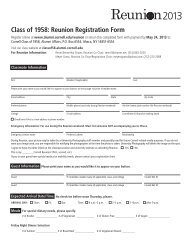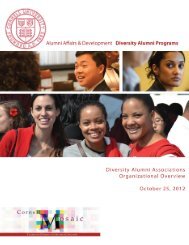Turning 20! - Alumni - Cornell University
Turning 20! - Alumni - Cornell University
Turning 20! - Alumni - Cornell University
Create successful ePaper yourself
Turn your PDF publications into a flip-book with our unique Google optimized e-Paper software.
Our Astute Founders: How It All Began<br />
1<br />
HISTORY<br />
Lilyan Affinito and President Hunter Rawlings<br />
It can and should be argued that founding the President’s Council<br />
of <strong>Cornell</strong> Women in 1990, by <strong>Cornell</strong> <strong>University</strong> President Frank<br />
H.T. Rhodes, was an astute and inspired idea. It came at the right<br />
time, and at the right <strong>University</strong>.<br />
Two successful <strong>Cornell</strong> alumnae, Lilyan Affinito ’53 and<br />
Patricia J. Carry Stewart ’50, who met in New York stuffing<br />
envelopes for the <strong>Cornell</strong> Women’s Club, brought this suggestion<br />
to President Rhodes in the late ‘80s. Some might have considered<br />
the idea radical. After all, <strong>Cornell</strong> was a male-dominated Ivy<br />
League university that excelled in engineering, agriculture,<br />
veterinary medicine, labor relations, physics and other disciplines<br />
that catered to men.<br />
Original Missions<br />
Yet <strong>Cornell</strong> is also one of the country’s pioneers in coeducation.<br />
Following co-founder Ezra <strong>Cornell</strong>’s famous dictum: “I would found<br />
an institution where any person can find instruction in any study,”<br />
<strong>Cornell</strong> admitted two women in 1870, the first institution of higher<br />
learning in the East to do so. (Oberlin College in Ohio admitted<br />
women in 1837.) In the Ivy League, <strong>Cornell</strong> and Penn were the<br />
only truly co-ed members for decades. The rest cordoned off their<br />
undergraduate women to Pembroke, Barnard or Radcliffe, or<br />
excluded them altogether.<br />
Guided by Lilyan and Pat’s initial suggestions, Rhodes<br />
proposed a council that would identify and engage accomplished<br />
women no longer connected to <strong>Cornell</strong> as alumnae, who would<br />
come together to help strengthen women’s roles across the<br />
university, while also advising him on women’s issues.<br />
Looking back, it’s almost as though President Rhodes was<br />
unwittingly reflecting Ezra <strong>Cornell</strong>’s quizzical notation about<br />
women cited below. PCCW founding member Frankie Cadwell,<br />
who had her own ad agency in New York (Cadwell Davis),<br />
unearthed the quotation from an Ezra letter (recipient unknown)<br />
when she was designing a PCCW brochure:<br />
There is a great reform required in the education and habits of<br />
females. Please study the subject and see what can be done for<br />
them --<br />
~Respectfully Yours, Ezra <strong>Cornell</strong><br />
Ithaca. July 24, 1869<br />
Changing Times<br />
What bothered Lilyan and Pat in the 1980s was a growing<br />
awareness that women had a great deal to offer universities,<br />
yet <strong>Cornell</strong> was missing out. After enjoying connections with<br />
<strong>Cornell</strong> through friends and classmates back in the Fifties, they<br />
were frustrated by a growing awareness that many alumnae<br />
Patricia C. Stewart and President Frank Rhodes<br />
dropped their <strong>Cornell</strong> ties once involved with careers and family.<br />
Meanwhile, Lilyan and Pat stayed involved and became close<br />
friends. Career success ultimately led them both to <strong>Cornell</strong>’s Board<br />
of Trustees -- Pat in 1967 and Lilyan in 1981 -- where they served<br />
together for 13 years.<br />
Moreover, a simmering assault on gender issues had brought on<br />
a whole new era for women. When Pat joined the board there was<br />
one other woman trustee (Adele Rogers), and by Lilyan’s election<br />
in 1981, with backing from Pat, there were 11. The Women’s<br />
Movement was well under way, sparked by Betty Friedan’s The<br />
Feminine Mystique in 1963, and accomplished professional women<br />
were increasing in numbers and visibility.<br />
Yet, in the 1970s and ‘80s, Lilyan and Pat recall being asked to<br />
recommend alumnae for leadership positions and coming up short<br />
for names. Then periodically, they would learn about a prominent<br />
woman who turned out to be a <strong>Cornell</strong>ian, and wonder why they<br />
hadn’t known of her through <strong>Cornell</strong>.<br />
Finding the Formula<br />
When they actually proposed PCCW as a concept, Pat says it<br />
had “ nothing to do with fundraising.” She wanted to find a way<br />
to “get women interested to see how their areas of expertise could<br />
help the university.” Lilyan was searching for a way to “expose<br />
women to what is going on at <strong>Cornell</strong>, spark their interest, and<br />
demonstrate opportunities to get involved.” These re-engaged<br />
women, then, “would be good role models for students and<br />
faculty; they would raise everyone’s awareness of what women can<br />
do.”<br />
After <strong>20</strong> years, it is clear that Lilyan and Pat’s hunch was indeed<br />
prescient. Via PCCW, scores of highly capable alumnae on <strong>Cornell</strong>’s<br />
class rosters, when asked, have enthusiastically re-engaged with<br />
their alma mater to work on <strong>Cornell</strong>’s behalf in supporting its<br />
scholarship, campus life and a mutual, evolving commitment to<br />
women’s leadership and success.<br />
Diana Daniels PCCW 1992, a past Board vice chair who also<br />
chaired <strong>Cornell</strong>’s last presidential search committee, and Jan Rock<br />
Zubrow PCCW 1992, Co-chair of <strong>Cornell</strong>’s Far Above Campaign,<br />
are but two examples. “Up until the early 90s, I had contributed<br />
to the annual fund each year, but I had not been engaged actively<br />
on <strong>Cornell</strong> maters,” recalls Daniels, a retired VP/General Counsel<br />
of the Washington Post Company. “When I was asked to join PCCW<br />
[1992] and I returned to campus, I was energized. The <strong>University</strong> is a<br />
vibrant place and I found the academic programs, faculty, administration<br />
and students to be really engaging and I wanted to be a part of it.”<br />
Jan, who heads her own venture capital firm (MedCapital),<br />
has noted that she, too, lost touch with <strong>Cornell</strong> while building her<br />
career and family. “The invitation to join PCCW [1991] came at the<br />
right time,” she says. “I wanted to do something for <strong>Cornell</strong> and PCCW



